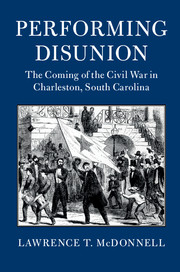5 - The Semblance of Safety
from CONTEXT: THE CITADEL BESIEGED
Published online by Cambridge University Press: 08 June 2018
Summary
For travelers to Charleston on the eve of secession, only two elements undercut King Street's buoyant materialism: the slaves and the police. They worried local whites too. In late September 1860, a “Citizen” strolling past the Citadel, short blocks from the city's commercial core, was astonished to encounter “the most disorderly crowds of negros I have ever witnessed.” Shouts of “blasphemy, obscenity, and profanity” echoed from the mostly male knots of carousing blacks, who mixed “bravado of manners” with a “recklessness of consequences” the white man found frightening. Where were the police, he wondered?
Quite possibly, they were striving to corral similar mobs of slaves and free blacks who roistered near the Market and rambled through White Point Gardens each Sunday afternoon. In this instance, “Citizen” saw a single patrolman wade into the sea of “several hundreds,” “many of them more or less intoxicated, and their profanity outrageous in the extreme.” At his approach, the black “scamps” scattered to nearby “dens,” but civic order's victory over servile “evil” was short- lived. On the very next day, “in this very spot,” another “ innocent” white man – passing along the street just as “Citizen” had done – was found murdered.
Further comment appeared unnecessary to both the Mercury and its correspondent, and no one was about to blow such distressing incidents of violence and insubordination into wild tales of impending revolt. All evidence pointed quite the other way. “One cannot walk a step” in Charleston, one observer declared, “without setting his foot on a negro.”
The irony was unintended but the point was true: black subjugation was the very foundation of white achievement here. Yet white Charleston anguished endlessly about the limits of its mastery over enslaved blacks and the all- too- free people of color who mingled in their midst. What was to be done and who would do it? Certainly not the police.
Blacks, slave and free, for generations a majority of Charleston's population, comprised barely 40 percent of residents in 1860. Yet they were essential to their overlords for economic production, domestic comfort, and social identity.
- Type
- Chapter
- Information
- Performing DisunionThe Coming of the Civil War in Charleston, South Carolina, pp. 92 - 114Publisher: Cambridge University PressPrint publication year: 2018

